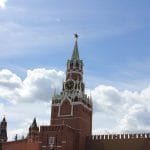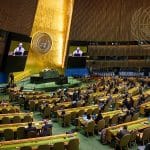The two EU candidate countries hoping for a major jump-start to their long-delayed EU accession procedures suffered a major setback on October 6 at Brdo, Slovenia, where the EU and Western Balkan leaders met to map out the next phase of the EU’s Enlargement process. The two countries seen as major losers from this engagement were Albania and North Macedonia, who had been banking on the Slovenian EU presidency and support from many within the European Commission to get their accession applications out of the quagmire of the last three years and onto some kind – actually any kind – of process that would deliver Tirana and Skopje concrete dates for the start of negotiations and not just the same old restated promises of the last years.
The primary source of disappointment was the failure of the Brdo declaration to mention Albania and North Macedonia by name or to include any concrete information about the so-called “intergovernmental conferences” that the EU organizes to launch accession negotiations.
See the full Brdo declaration here: https://www.consilium.europa.eu/media/52280/brdo-declaration-6-october-2021-en.pdf
Do not act surprised, but does it matter?
Media reporting from Brussels over the previous week had revealed EU member states could not agree on the forward-leaning declaration language the Commission and candidate countries themselves wanted. These leaks had the effect of mobilizing the pro-Enlargement NGOs, lobbyists, and some think tanks into generating a steady flow of angry denouncements of the outcome, some even before the declaration was released, and the torrent of similar missives and passionate op-eds by senior officials/experts about “lost opportunities” in the Western Balkans will clearly increase now. Some Enlargement boosters will argue that Brdo represents the “low point” in EU relations with the Western Balkans as the Slovenian presidency was unable even to get 2030 agreed as an admission target date, a step back from the 2025 target some optimists had held up.
But that kind of label misses the key issue. Whether the average EU citizen will pay much attention, being far more worried about soaring energy prices and the COVID-19 pandemic or even uncontrolled migration, remains an open question and there is even talk of an anti-Enlargement backlash heard in some member states based on lessons learned from bringing Romania and Bulgaria into the EU too quickly, as well as the role that uncontrolled legal migration into the UK ultimately played in triggering Brexit. To put it diplomatically, it does not appear that Enlargement is currently a burning issue for the populace outside of the candidate countries and a small number of their advocates.
Member states make the rules
The timing of the next phase of EU Enlargement requires an agreed member state consensus and quite a few believe other EU-wide and global issues are more important at the moment. The Brdo document even states “We also recall the importance that the EU can maintain and deepen its own development, ensuring its capacity to integrate new members.” Accordingly, it is not up to leaders in Tirana or Skopje, or their advocates, to make demands of EU members, but it is absolutely fair and intellectually honest to quietly wonder about the political fates of the moderate Atlantic-oriented leaders in both countries and also to ask about non-EU countries’ (read China) economic penetration of the region if Brussels is seen as preoccupied elsewhere.
Without encouragement from Brussels that painful reforms undertaken in recent years will help to open the path to EU accession in their lifetimes the pro-Western leaders’ careers could be short-lived. It is clear that Commission President Ursula von der Leyen’s Slovenian promises, while soothing, are simply not going to be enough for Tirana or Skopje. “The message is that the Western Balkans belong to the European Union. We want them in the European Union. We are one European family” she declared.
Stoic reactions for now
For the moment, no local political crisis has emerged in the Western Balkans in the short period since the Brdo Declaration was released. Nor has the US State Department seen fit to weigh in as it frequently does on the question of EU Enlargement, even though its opinion is never requested.
The issue now will be to monitor and manage the reactions in the Western Balkans, where disappointment will clearly jolt the political status quo. The regional leaders can still point to the Brdo declaration’s promise of eventual admission (sometime after 2030), but it will be hard to hold the line against hard-liners and go-it-alone nationalists with that alone: “the EU reaffirms its unequivocal support for the European perspective of the Western Balkans.” As any diplomat can tell you, as a compromise text, it is certainly better than nothing.
North Macedonian leaders of course understand with crystal clarity that until their dispute with Bulgaria over language and identity is resolved, their accession application can not be moved onto a fast track. Discussions on the sidelines at Brdo revealed that both sides are at least talking about a solution, but Bulgaria, under intense pressure from some of its EU partners to make concessions, is not backing off on its core demand that North Macedonia stop the “subtle erasure” of the Bulgarian identity inside North Macedonia.
It is a question now however as to when Albania and North Macedonia will agree to take the dreaded step of “decoupling” their applications so that Albania can move ahead and some kind of Enlargement momentum within the EU is generated.
Enlargement: EU’s turgid Brdo Declaration seen as a “fail”
While not unexpected, the Brdo outcome was a major disappointment to hopeful candidate countries
www.consilium.europa.eu

The EU-Western Balkans summit in Brdo pri Kranju, Slovenia, 6 October 2021. Family picture.
- Advertisement -
- Advertisement -







